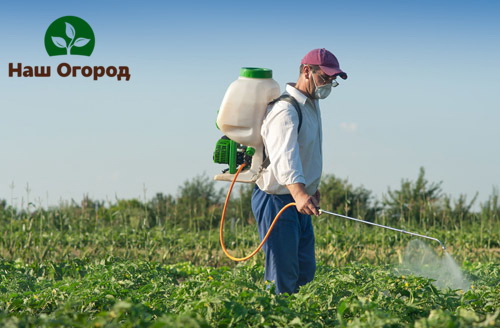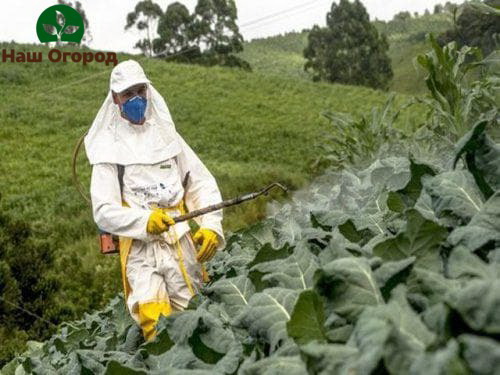We will learn all the secrets of insidious pesticides
Content:
With the passage of time and the development of gardening, the question of combating crop diseases and the so-called "pests" - insects and / or microorganisms that adversely affect growth, contributing to a poor harvest or even its absence - was increasingly raised. So pesticides were artificially developed, which are still used by many summer residents.

Classification
Pesticides are a wide group of chemicals designed to kill insect pests (insecticides), fight pathogens of fungal diseases (fungicides), as well as unwanted vegetation (herbicides). Some of them also include biological components, and drugs can also differ in spectrum and mode of action.
Insecticides
- Insecticides are divided into: contact, a prerequisite for the triggering of the effect of which is the external contact of the insect with the drug; intestinal, suggesting that an insect enters the body with food; systemic, poisoning the plant itself with pesticides, when eating the infected parts of which the pests are poisoned and die.
Fungicides
- Fungicides suggest a classification scheme similar to insecticides: contact and systemic. When pathogenic pathogens penetrate into plant tissues, when faced with fungicides, they can no longer have any negative effect. Systemic fungicides have an internal curative effect, prevent and signal the development of plant diseases.
Herbicides
- Herbicides are distinguished into continuous and selective action. The former, as the name implies, contribute to the destruction of any vegetation, while the latter are aimed at specific weeds.
According to the degree of danger and permission of use, pesticides are divided into three classes:
The first class is extremely potent drugs of increased danger, the use of which is not supposed to be used in home gardens.
The second class is highly toxic drugs, the use of which is permitted in home gardens.
The third class - drugs of medium hazard and toxicity, are approved for use in home gardens.
The fourth class - low-toxic drugs, safe for use in vegetable gardens.
Pesticides: Uses and Precautions
Due to the fact that most drugs are toxic and pose a danger to humans, the use of insecticides requires special training and knowledge of precautions. In some cases, you should seek professional help rather than take on the processing yourself.
During the application of the preparations, closed clothing should be used, avoiding the ingress of pesticides on the mucous membrane, skin, glass glasses are used to protect the eyes, and rubber gloves are used for hands. Processing work is best done in calm weather, both for general convenience and to avoid unpleasant consequences. Immediately after treatment with pesticides, water procedures are mandatory

The solution for application should not be prepared in advance, because it simply will not persist until processing. It is forbidden to store drugs in the immediate vicinity of food utensils and cutlery, food.
Also, in order to avoid poisoning of pollinating insects and flowers, it is not recommended to carry out the processing procedure during the flowering period.It is better to use biological preparations or special solutions that are prepared on the basis of insecticidal plants.
Decomposition
Pesticides, once in the soil after application, tend to decompose not immediately, but gradually, over a period of three months to two years. The rate of decomposition is undoubtedly influenced by the soil and climatic conditions of a given region. For example, the decomposition of drugs under the influence of high temperatures and a humid environment occurs much faster than in dry and cold areas. Some pesticides can be lost through evaporation with water vapor, when exposed to sunlight.
Pesticides and their disadvantages
Unfortunately, most pesticides, especially in large quantities, negatively affect the activity of microbiological processes in the soil. Often, drugs act as so-called stressors for plants, disrupting their hormonal levels. However, the use of pesticides in small, reasonable doses at the same time helps stimulate respiration, growth and increase yields.
The gradual accumulation of pesticides in the soil entails the death of especially sensitive crops, their oppression. Contamination with compounds unusual for the soil is also noted, disrupting the stability of the fauna and creating a risk of mutations.
When plants are increasingly attacked by pests and diseases, the garden is in decline, many gardeners have no choice but to resort to the use of pesticides. In fact, you should not be afraid of using it, you just need to competently and rationally approach this issue, so as not to make it worse. If you are not confident in your own strengths and experience, it is better to consult a specialist.

